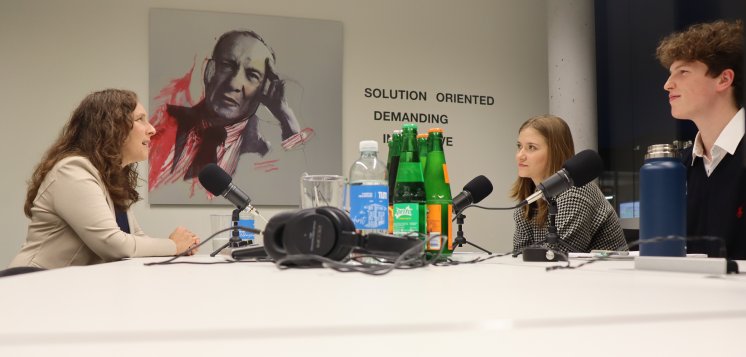Before the official event, the budding astronaut takes time for a group of students who are recording a podcast with her. Even as a child Randall dreamed of flying into space, but her path could have led her to the sea. "My second dream job was to be a pirate," she says and laughs. "I just wanted to travel and see the world, I never had a concrete plan."
75,000 years to the next star
Shortly after the podcast recording, the "Journey to the Stars" begins for everyone else in a large lecture hall. Randall intervenes to clarify: "With today's rocket engines, it will take us 75,000 years to reach the nearest star. The plan is to fly into Earth orbit or to the moon." However, the path from doctor of astrophysics to astronaut was a rocky one and led via the initiative of the same name, "Die Astronautin", which campaigns for more equal opportunities in research. Until now, medical self-experiments in space have been carried out almost exclusively by men.
Suzanna Randall describes the selection process: "Out of 400 women, two were chosen and I wasn't even there at first." Then Randall did what has often helped her in life: "Step back! Sometimes the problems solve themselves." In this case, the tactic worked. While she was researching in Japan, the call came. One of the two candidates had dropped out and she stepped up. Since then, she and Insa Thiele-Eich have formed the astronaut team.
Another myth that Suzanna Randall dispels: "As an astronaut, you don't have to be super fit and be able to run a marathon. Versatility and, of course, health are much more important." During her training, she completed isolation training in a cave, underwater training in uncomfortable spacesuits and, somewhat intimidated at first, had to draw her own blood. "I enjoyed the parabolic flights the most, where we simulated weightlessness," she says, pointing out the positive aspects of the training. In general, she has found that the air is her element, whether paragliding or getting her pilot's license.
Jump start desired
So the astrophysicist is physically and mentally ready, when can the journey begin? "At the moment, it all depends on the funding. If we had the money tomorrow, and we're talking about around 50 million euros, then we could fly in around nine to twelve months." As the two women are not employed by the ESA (European Space Agency), but are supported by the "Die Astronautin" initiative, they are largely responsible for the funding themselves. "You need a pretty high tolerance for frustration and patience," explains Randall and continues: "We've spent a lot of time going door-to-door in Berlin, unfortunately with only moderate success so far."
In the open Q&A session, she also reveals her favorite planet: "I was fascinated by Neptune from the very beginning, which is why my cat is called Triton, like the planet's largest moon." When asked by a student, she explains how important it is to be a role model for young women in particular, just as the American NASA astronaut Sally Ride was for her in 1983 as the first Western woman in space. She was also able to take part in a groundbreaking discovery: "I worked for three years at the Extremely Large Telescope (the largest telescope in the world with a diameter of 39 meters). The later Nobel Prize winner Reinhard Genzel was there with his team and so I was there live when the black hole in the center of our galaxy was discovered."
After the event, participants will have time to touch extraterrestrial rock samples and take a look through a telescope, provided by the Robert Mayer Observatory. Who knows, the next time Suzanna Randall visits the TUM Campus Heilbronn, her big dream may already have come true.
The "Learning from Legends" event series will also continue. In the summer semester 2024, we are expecting the South Tyrolean star chef de cuisine Norbert Niederkofler with his "Cook the Mountain" concept.



